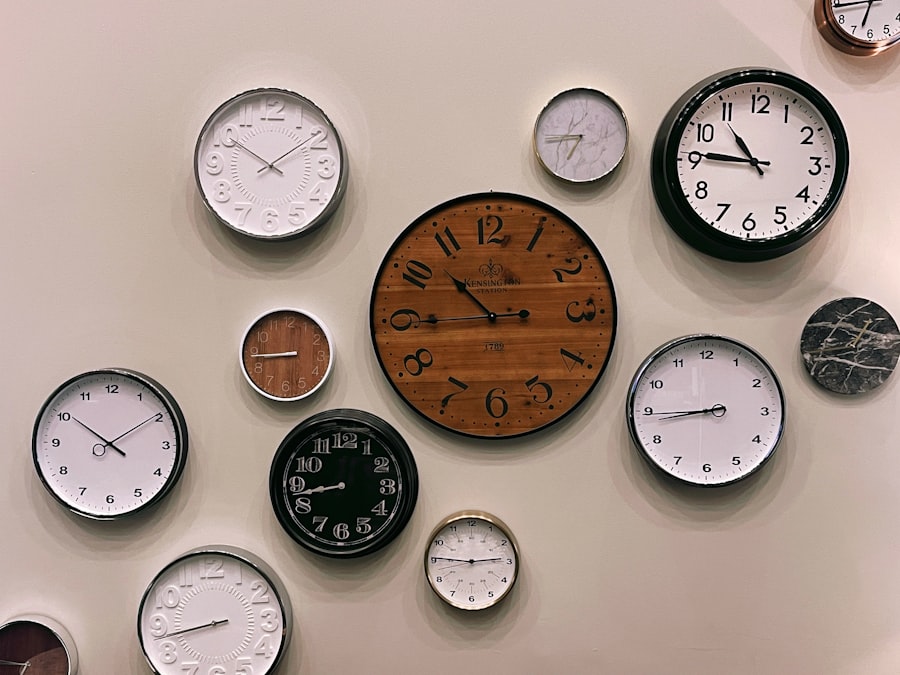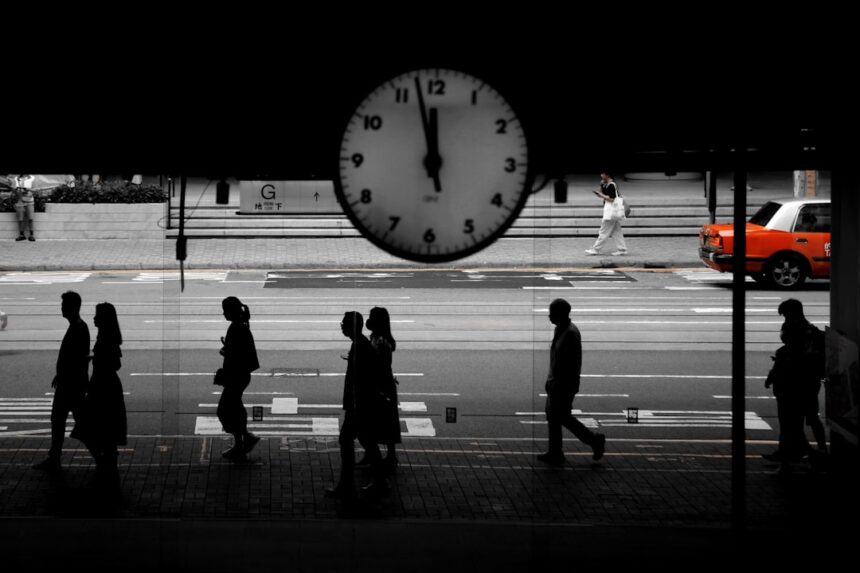Time perception is a fascinating area of study that delves into how you experience the passage of time. It is not merely a function of the clock ticking away; rather, it involves complex cognitive processes that are influenced by various factors, including attention, memory, and sensory input. Neuroscientists have identified specific brain regions, such as the suprachiasmatic nucleus and the parietal cortex, that play crucial roles in how you perceive time.
These areas help regulate your internal clock and process temporal information, allowing you to gauge how long an event lasts or how quickly time seems to pass. Your perception of time can vary significantly depending on the context in which you find yourself. For instance, when you are engaged in an enjoyable activity, time may seem to fly by, while moments of boredom can stretch endlessly.
This subjective experience of time is not just a quirk of human psychology; it has profound implications for how you navigate your daily life. Understanding the science behind time perception can help you make sense of your experiences and even improve your time management skills.
Key Takeaways
- Time perception is influenced by various factors such as attention, memory, and emotions.
- Emotions play a significant role in how we perceive time, with positive emotions making time seem to pass more quickly and negative emotions making time seem to drag on.
- Cultural differences can impact how individuals perceive and value time, with some cultures placing a higher emphasis on punctuality and others having a more relaxed attitude towards time.
- The illusion of time refers to the subjective experience of time passing, which can be influenced by factors such as attention, arousal, and memory.
- As we age, our perception of time may change, with older adults often perceiving time as passing more quickly than younger individuals.
Factors Affecting Time Perception
Several factors influence how you perceive time, and these can be broadly categorized into physiological, psychological, and environmental elements. Physiologically, your age, health, and even your level of arousal can affect your sense of time. For example, younger individuals often report that time seems to pass more slowly than it does for older adults.
This phenomenon may be linked to the way your brain processes new experiences; as you accumulate more memories over the years, the relative novelty of each moment diminishes, leading to a faster perception of time. Psychological factors also play a significant role in shaping your experience of time. Your attention and focus can either speed up or slow down your perception.
When you are fully immersed in an activity, your brain tends to filter out distractions, allowing you to lose track of time. Conversely, when you are anxious or preoccupied with worries, every minute can feel like an eternity. Environmental factors, such as the presence of clocks or the nature of your surroundings, can further influence your perception.
For instance, being in a stimulating environment may make time feel like it is moving faster compared to a monotonous setting.
The Role of Emotions in Time Perception

Emotions are powerful drivers of your experience of time. When you are happy or excited, time often seems to fly by; conversely, during moments of fear or sadness, it can feel as though time has come to a standstill. This emotional influence on time perception is not merely anecdotal; research has shown that heightened emotional states can alter your brain’s processing speed and attention mechanisms, leading to a skewed sense of time.
For example, during a thrilling event like a roller coaster ride, your adrenaline levels spike, making every second feel more intense and memorable. Moreover, the way you remember past events is also colored by your emotional state at the time. When you look back on significant life moments—be they joyful or traumatic—you may find that they occupy a larger space in your memory than mundane experiences.
This emotional weight can create the illusion that those moments lasted longer than they actually did. Understanding this connection between emotions and time perception can help you navigate your feelings more effectively and appreciate the fleeting nature of joyful experiences.
Cultural Differences in Time Perception
| Country | Time Perception |
|---|---|
| United States | Time is seen as a resource to be managed and used efficiently |
| Japan | Time is seen as a collective concept and punctuality is highly valued |
| Spain | Time is more flexible and social interactions often take precedence over punctuality |
| Germany | Punctuality is highly valued and being on time is a sign of respect |
Cultural background significantly shapes how you perceive and value time. In some cultures, punctuality and strict adherence to schedules are paramount, while in others, a more fluid approach to time is embraced. For instance, in many Western societies, being on time is often seen as a sign of respect and professionalism.
In contrast, cultures that prioritize relationships over schedules may view time as more flexible, allowing for spontaneous interactions and a more relaxed pace of life. These cultural differences extend beyond mere punctuality; they also influence how you experience the passage of time in daily life. In cultures that emphasize collectivism and community, you may find that shared experiences create a sense of timelessness, where moments spent together feel richer and more meaningful.
Conversely, in individualistic cultures that prioritize personal achievement and efficiency, there may be a tendency to rush through experiences in pursuit of goals. Recognizing these cultural nuances can enhance your understanding of how different societies approach time and help you navigate cross-cultural interactions more effectively.
The Illusion of Time
The concept of the illusion of time is both intriguing and perplexing. You may often find yourself questioning why certain moments seem to drag on while others fly by in an instant. This discrepancy arises from the way your brain processes information and constructs your experience of reality.
Time is not an absolute entity; rather, it is a subjective experience shaped by your perceptions and interpretations. One fascinating aspect of this illusion is the phenomenon known as “time dilation,” which occurs under specific conditions such as extreme emotional states or altered states of consciousness. For example, during a near-death experience or an intense moment of fear, many people report feeling as though time has slowed down dramatically.
This sensation can be attributed to heightened awareness and increased cognitive processing during such events. Understanding the illusion of time can empower you to appreciate the richness of each moment and encourage mindfulness in your daily life.
Time Perception and Aging

As you age, your perception of time undergoes notable changes. Many older adults report that time seems to pass more quickly than it did in their youth. This phenomenon can be attributed to several factors, including the accumulation of experiences and memories over the years.
When you are young, each new experience feels significant and memorable; however, as you grow older and routines become more established, the novelty diminishes, leading to a faster perception of time. Additionally, biological changes associated with aging can also impact your sense of time. Research suggests that changes in brain chemistry and cognitive processing speed may contribute to altered perceptions as you age.
Understanding these shifts can help you embrace the present moment more fully and find ways to infuse novelty into your daily life—whether through new hobbies or social interactions—to counteract the feeling that time is slipping away too quickly.
Time Perception in Different Activities
Your perception of time can vary dramatically depending on the activity in which you are engaged. When participating in activities that require intense focus or creativity—such as painting or playing music—you may find that hours pass without notice. This phenomenon is often referred to as “flow,” a state where you become so absorbed in what you’re doing that external distractions fade away.
Conversely, during monotonous tasks or activities that lack engagement—like waiting in line or completing repetitive chores—time can feel like it drags on indefinitely. The key takeaway here is that actively engaging with your surroundings and seeking out stimulating experiences can enhance your enjoyment of life while altering your perception of time’s passage. By consciously choosing activities that captivate your interest, you can create a richer tapestry of experiences that make each moment feel more substantial.
Time Perception and Memory
Your memory plays a crucial role in shaping how you perceive time. The way you encode and retrieve memories influences not only how long an event feels but also how significant it appears in retrospect. When you reflect on past experiences filled with rich details and emotions, those moments tend to stand out more vividly in your mind, creating the impression that they lasted longer than they actually did.
Moreover, the act of reminiscing itself can alter your perception of time. Engaging with memories—whether through storytelling or revisiting photographs—can evoke emotions that enhance your connection to those moments. This interplay between memory and time perception highlights the importance of creating meaningful experiences in your life; by doing so, you enrich your memory bank and cultivate a deeper appreciation for the passage of time.
The Impact of Technology on Time Perception
In today’s fast-paced digital world, technology has profoundly influenced how you perceive and interact with time. The constant barrage of notifications and information can create a sense of urgency that distorts your experience of temporal flow. With smartphones at your fingertips, it’s easy to become distracted by social media or endless scrolling through content—activities that often lead to a warped sense of how much time has passed.
Moreover, technology has introduced new ways to measure and manage time, from productivity apps to timers designed to optimize efficiency. While these tools can enhance your ability to manage tasks effectively, they can also contribute to an overwhelming sense of pressure to maximize every moment. Striking a balance between leveraging technology for productivity while remaining mindful of its impact on your perception of time is essential for maintaining well-being in an increasingly connected world.
Strategies for Improving Time Perception
Improving your perception of time involves cultivating mindfulness and awareness in your daily life. One effective strategy is to practice mindfulness meditation, which encourages you to focus on the present moment without judgment. By training yourself to be more aware of your thoughts and feelings as they arise, you can enhance your ability to savor experiences rather than rush through them.
Another approach is to introduce variety into your routine by seeking out new experiences or challenges that stimulate your senses and engage your mind. Whether it’s trying a new hobby or exploring unfamiliar places, these activities can create lasting memories that enrich your perception of time’s passage. Additionally, setting aside dedicated periods for reflection—such as journaling—can help reinforce positive memories and foster a deeper appreciation for each moment.
Practical Applications of Understanding Time Perception
Understanding time perception has practical applications across various aspects of life—from personal development to professional settings.
By creating an environment that fosters engagement and minimizes distractions, employers can enhance employees’ focus and satisfaction.
On a personal level, being aware of how emotions influence your experience of time can help you navigate relationships more effectively. By prioritizing meaningful interactions with loved ones and creating shared experiences that evoke positive emotions, you can enrich both your memories and your perception of time spent together. Ultimately, understanding the intricacies of time perception empowers you to live more intentionally and appreciate the fleeting nature of each moment in life.
In exploring the fascinating realm of time perception, one might find it intriguing to delve into the psychological aspects that influence how we perceive time’s passage. An insightful article that complements this topic can be found on Unplugged Psych, where various psychological phenomena are discussed in depth. For those interested in understanding more about the intricacies of human perception and cognition, I recommend checking out this related article on their website. This resource provides a broader context and enriches the discussion on how our minds interpret the flow of time.
WATCH THIS! Is This Hidden ADHD Sign Quietly Wrecking Your Sleep and Draining Your Energy?
FAQs
What is time perception?
Time perception refers to the subjective experience of time, including the perception of the passage of time, the estimation of time intervals, and the ability to accurately judge the duration of events.
How does time perception work?
Time perception is influenced by various factors, including attention, arousal, memory, and the brain’s internal clock. It is also influenced by external factors such as the environment and social context.
What factors can affect time perception?
Factors that can affect time perception include age, emotions, cognitive load, attentional focus, and the presence of distractions. Cultural differences and individual differences in personality and cognitive abilities can also play a role.
Can time perception be altered?
Yes, time perception can be altered through various means, such as meditation, mindfulness practices, and certain drugs. Additionally, psychological conditions such as anxiety and depression can also alter time perception.
Why is time perception important?
Time perception is important for various aspects of human behavior and cognition, including decision-making, motor control, and the ability to navigate and interact with the environment. It also plays a role in our subjective experience of the world.




